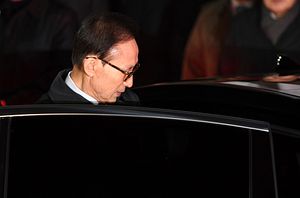The King is a South Korean movie that exposes the darker side of South Korea’s prosecution system. This fictional drama talks about how some prosecutors in South Korea accumulated power and authority by siding with the right candidate every time there was a presidential election.
In the movie, these few power-seeking prosecutors cover up major scandals and cases involving powerful politicians and celebrities to exploit them later when necessary. In other words, they use crimes and other legal cases as means to control politics and expand their power.
The prosecution system in South Korea is a perpetual subject of public criticism lobbied at prosecutors who reportedly have gone beyond their original mandate of protecting justice and are instead using their cases as tools for political retribution.
This is part of the historical background of why the Moon administration is so adamant on overhauling the prosecution system, and the reason why South Korean public opinion is clearly divided over the recent arrest of former President Lee Myung-bak.
Lee was arrested on March 23 for allegations of embezzlement and misappropriation of more than $32 million. He is also charged with illegal acquisition of funds allocated to a government agency and receiving illicit money from the private sector, including Samsung.
He is the second former president to be arrested in the past year, following former President Park Geun-hye. Park was arrested after the Choi-Gate scandal, named for Choi Soon-sil, a cult leader’s daughter, who was involved in masterminding government policy during the Park administration.
Lee was escorted by several of his close aides and family members when a vehicle arrived in front of his residence for the arrest. Despite the heavy mood, several groups of people were heard shouting in joy, welcoming the former president’s arrest.
Shortly before his arrest, Lee uploaded a three-page letter to his Facebook account, written a day before his arrest, describing his wishes to “help his colleagues and families unload their pain by getting arrested.” He did not mention the allegations against him, but wrote that he wishes to “take back his true manifestations and say what he has to say.”
The process leading to Lee’s arrest went quickly enough as several of his close aides confided to the prosecutor’s office about the allegations put against the former president.
Kim Hee-jung, former senior aide and “Lee’s closest butler” during the Lee administration, was the key man responsible for changing the tide of investigation. He told the investigators that more than $90,000 was withdrawn from South Korea’s National Intelligence Service and handed over to the former first lady’s administration officer.
According to Chung Doo-eon, former assemblyman and one of the closest aides to Lee, Kim’s decision to confide in the investigators was based on the sense of betrayal he felt toward Lee, who was claimed to have completely abandoned Kim when he was sentenced to imprisonment for one year under charges of bribery. Kim’s wife committed suicide during his confinement.
Lee’s arrest sparked another wave of political strife — extending from the previous debate concerning former President Park Geun-hye — on whether the arrest was based on the rule of law or a product of political retribution.
Hong Jun-pyo, leader of the largest opposition party, the Liberty Korea Party, wrote on his Facebook account that former President Lee was “arrested five years after he left office for charges of personal matters related to corruption,” adding that “former president Lee and Park’s closest aides have betrayed them.”
He also questioned if it was “a good decision to arrest another former president from the opposition after already impeaching and arresting former president Park for charges of exploiting state affairs.” He then went on to criticize current President Moon Jae-in, saying that his intention is “to put up a show of political retribution under the banners of rooting out corruption.”
Other minority opposition leaders, on the other hand, saw the arrest as justice being served. Park Ju-seon, leader of the Bareunmirae Party, said “President Lee should face the charges against him and be tried and punished for his crimes,” adding that “he never would have been put to retribution if his hands were clean in the first place.” Lee Jeong-mi, leader of the Justice Party, said that “execution of justice is unstoppable,” adding that “all power comes from the people, and justice flows like a river.”
The ruling Minjoo Party of Korea stopped short of welcoming the result, but stated that the arrest was “reasonable.” Choo Mi-ae, leader of the ruling party, wrote on her Facebook account that “nine years of corrupted governance tainted with scandals, injustice, and exploitation of the constitutional government and state affairs have finally come to an end.”
Choo added that “this tragedy in the history of our constitutional government should never repeat itself again, for its pain goes to the people.”
Kim Eui-kyeom, spokesperson for the Blue House, stated that the Blue House will “always remain strict to itself.”
Lee’s arrest comes as a fatal blow to the conservatives, especially to the Liberty Korea Party, which was once home to former President Lee as well as former President Park. Now that both presidents have been arrested and the party internally divided, its prospects for the upcoming local elections in June are only darkening.

































